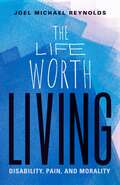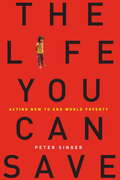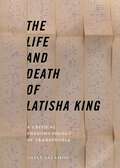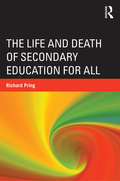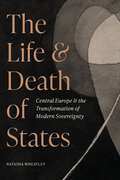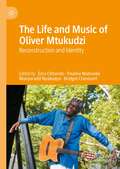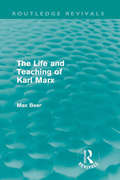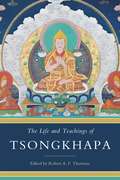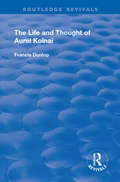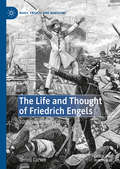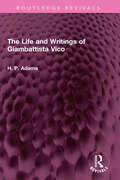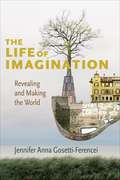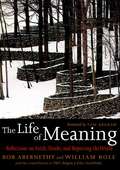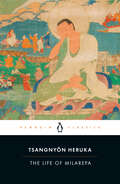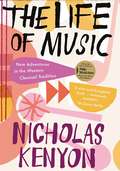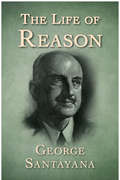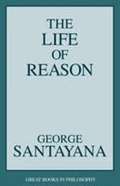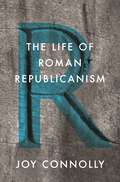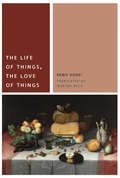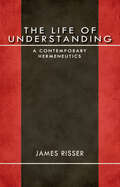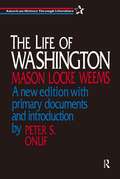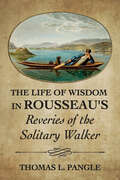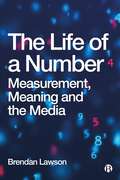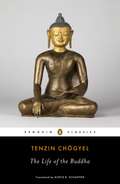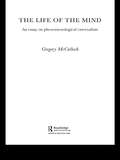- Table View
- List View
The Life Worth Living: Disability, Pain, and Morality
by Joel Michael ReynoldsA philosophical challenge to the ableist conflation of disability and pain More than 2,000 years ago, Aristotle said: &“let there be a law that no deformed child shall live.&” This idea is alive and well today. During the past century, Supreme Court Justice Oliver Wendell Holmes Jr. argued that the United States can forcibly sterilize intellectually disabled women and philosopher Peter Singer argued for the right of parents to euthanize certain cognitively disabled infants. The Life Worth Living explores how and why such arguments persist by investigating the exclusion of and discrimination against disabled people across the history of Western moral philosophy. Joel Michael Reynolds argues that this history demonstrates a fundamental mischaracterization of the meaning of disability, thanks to the conflation of lived experiences of disability with those of pain and suffering. Building on decades of activism and scholarship in the field, Reynolds shows how longstanding views of disability are misguided and unjust, and he lays out a vision of what an anti-ableist moral future requires. The Life Worth Living is the first sustained examination of disability through the lens of the history of moral philosophy and phenomenology, and it demonstrates how lived experiences of disability demand a far richer account of human flourishing, embodiment, community, and politics in philosophical inquiry and beyond. Accessibility features: Retail e-book files for this title are screen-reader friendly with images accompanied by short alt text and/or extended descriptions.
The Life You Can Save: Acting Now to End World Poverty
by Peter SingerThis is the right time to ask yourself: "What should I be doing to help?" For the first time in history, it is now within our reach to eradicate world poverty and the suffering it brings. Yet around the world, a billion people struggle to live each day on less than many of us pay for bottled water. And though the number of deaths attributable to poverty worldwide has fallen dramatically in the past half-century, nearly ten million children still die unnecessarily each year. The people of the developed world face a profound choice: If we are not to turn our backs on a fifth of the world's population, we must become part of the solution. In The Life You Can Save, philosopher Peter Singer, named one of "The 100 Most Influential People in the World" by Time magazine, uses ethical arguments, provocative thought experiments, illuminating examples, and case studies of charitable giving to show that our current response to world poverty is not only insufficient but ethically indefensible. Singer contends that we need to change our views of what is involved in living an ethical life. To help us play our part in bringing about that change, he offers a seven-point plan that mixes personal philanthropy (figuring how much to give and how best to give it), local activism (spreading the word in your community), and political awareness (contacting your representatives to ensure that your nation's foreign aid is really directed to the world's poorest people). In The Life You Can Save, Singer makes the irrefutable argument that giving will make a huge difference in the lives of others, without diminishing the quality of our own. This book is an urgent call to action and a hopeful primer on the power of compassion, when mixed with rigorous investigation and careful reasoning, to lift others out of despair.
The Life and Death of Latisha King: A Critical Phenomenology of Transphobia (Sexual Cultures #10)
by Gayle SalamonWhat can the killing of a transgender teen can teach us about the violence of misreading gender identity as sexual identity?The Life and Death of Latisha King examines a single incident, the shooting of 15-year-old Latisha King by 14-year-old Brian McInerney in their junior high school classroom in Oxnard, California in 2008. The press coverage of the shooting, as well as the criminal trial that followed, referred to Latisha, assigned male at birth, as Larry. Unpacking the consequences of representing the victim as Larry, a gay boy, instead of Latisha, a trans girl, Gayle Salamon draws on the resources of feminist phenomenology to analyze what happened in the school and at the trial that followed. In building on the phenomenological concepts of anonymity and comportment, Salamon considers how gender functions in the social world and the dangers of being denied anonymity as both a particularizing and dehumanizing act. Salamon offers close readings of the court transcript and the bodily gestures of the participants in the courtroom to illuminate the ways gender and race were both evoked in and expunged from the narrative of the killing. Across court documents and media coverage, Salamon sheds light on the relation between the speakable and unspeakable in the workings of the transphobic imaginary. Interdisciplinary in both scope and method, the book considers the violences visited upon gender-nonconforming bodies that are surveilled and othered, and the contemporary resonances of the Latisha King killing.
The Life and Death of Secondary Education for All
by Richard PringIs there life after death for secondary education? This book focuses upon the quality of learning. ‘Reform’, so called, too often begins with qualifications, examinations, institutional provision, paths of progression. All those are very important, but their value lies in the support they give to learners and their learning in its different forms. One needs to start with the aims of education and then with what it means to learn (practically, theoretically, morally) and with the very many different needs of the learners. That is what this book aims to do. In so doing, it will be both philosophical in analysis and empirical in example. So much is happening ‘from down below’ that goes unrecognised by policy makers. But innovations too often get hampered by government interventions, by a bureaucratic mentality and by failure to spread good practice. The general argument of the book, therefore, will be illustrated throughout with detailed references to practical developments in schools, colleges, the third sector, youth work, independent training providers and professional bodies – across several countries. The book builds on Education for All, which was based on 14-19 research into secondary education, this book transcends the particularities of England and Wales and digs more deeply into those issues which are at the heart of educational controversy, policy and practices and which survive the transience of political change and controversy. The issues (the aims of education, standards of performance, the consequent vision of learning, the role of teachers, progression from school to higher or further education and into employment, the provision of such education and training and the control of education) are by no means confined to the UK, or to this day and age. Pring identifies similar problems in other countries such as the USA, Germany and France – and indeed in the Greece of Plato and Aristotle and offers solutions with a comparative perspective. It is a critical time. Old patterns of education and its provision are less and less suitable for facing the twenty-first century. The patterns and modes of communication have changed radically in a few years and those changes are quickening in pace. The economic context has been transformed, affecting the skills and knowledge needed for employment. The social world of young people raises fresh demands, hopes and fears. A global recession has affected young people disproportionately making quality of life and self-fulfilment ever more difficult to attain. In addressing ‘learning’ and the ‘learners’ first and foremost, the book will argue for a wider vision of learning and a more varied pattern of provision. Old structures must give way to new.
The Life and Death of States: Central Europe and the Transformation of Modern Sovereignty
by Natasha WheatleyAn intellectual history of sovereignty that reveals how the Habsburg Empire became a crucible for our contemporary world orderSprawled across the heartlands of Europe, the Habsburg Empire resisted all the standard theories of singular sovereignty. The 1848 revolutions sparked decades of heady constitutional experimentation that pushed the very concept of &“the state&” to its limits. This intricate multinational polity became a hothouse for public law and legal philosophy and spawned ideas that still shape our understanding of the sovereign state today. The Life and Death of States traces the history of sovereignty over one hundred tumultuous years, explaining how a regime of nation-states theoretically equal under international law emerged from the ashes of a dynastic empire.Natasha Wheatley shows how a new sort of experimentation began when the First World War brought the Habsburg Empire crashing down: the making of new states. Habsburg lands then became a laboratory for postimperial sovereignty and a new international order, and the results would echo through global debates about decolonization for decades to come. Wheatley explores how the Central European experience opens a unique perspective on a pivotal legal fiction—the supposed juridical immortality of states.A sweeping work of intellectual history, The Life and Death of States offers a penetrating and original analysis of the relationship between sovereignty and time, illustrating how the many deaths and precarious lives of the region&’s states expose the tension between the law&’s need for continuity and history&’s volatility.
The Life and Music of Oliver Mtukudzi: Reconstruction and Identity
by Ezra Chitando Pauline Mateveke Munyaradzi Nyakudya Bridget ChinouririThis book is a critical reflection on the life and career of the late legendary Zimbabwean music icon, Oliver “Tuku” Mtukudzi, and his contribution towards the reconstruction of Zimbabwe, Africa and the globe at large. Mtukudzi was a musician, philosopher, and human rights activist who espoused the agenda of reconstruction in order to bring about a better world, proposing personal, cultural, political, religious and global reconstruction. With twenty original chapters, this vibrant volume examines various themes and dimensions of Mtukudzi’s distinguished life and career, notably, how his music has been a powerful vehicle for societal reconstruction and cultural rejuvenation, specifically speaking to issues of culture, human rights, governance, peacebuilding, religion and identity, humanism, gender and politics, among others. The contributors explore the art of performance in Mtukudzi’s music and acting career, and how this facilitated his reconstruction agenda, offering fresh and compelling perspectives into the role of performing artists and cultural workers such as Mtukudzi in presenting models for reconstructing the world.
The Life and Teaching of Karl Marx (Routledge Revivals)
by Max BeerFirst published in English in 1921, this work was originally written by renowned Marxist historian Max Beer to commemorate the centenary of Marx’s birth. It is a definitive biography, full of interesting personal details and a clear and comprehensive account of Marx’s economic and historical doctrines A special feature of this unique work is the new light thrown on Marx’s attitude to the "Dictatorship of the Proletariat" and Bolshevist methods generally.
The Life and Teachings of Tsongkhapa
by Robert A.F. ThurmanA must-read for students of Tibetan Buddhism, The Life and Teachings of Tsongkhapa provides a thorough exploration of the great teacher’s wisdom.In The Life and Teachings of Tsongkhapa, you’ll discover Tsongkhapa’s teachings on transcendental aspects of sutra, tantra, and insight meditation, mystic conversations with great bodhisattvas, deeply spiritual songs in praise of Manjushri and Maitreya, and much more. The anthology concludes with a number of intensely moving songs in praise of Tsongkhapa and his immeasurable contribution to Tibetan Buddhism by such realized and remarkable Tibetan Buddhists as the Seventh Dalai Lama, the Eighth Karmapa, Dulnagpa Palden, and Khedrup Je. This edition has been substantially corrected by Robert Thurman and contains a new introduction and a bibliography of all the works referenced in the text.
The Life and Thought of Aurel Kolnai
by Francis DunlopThis title was first published in 2002: ’I sincerely believe that Dr Kolnai is one of the most original and stimulating thinkers in the field of political philosophy alive today.’ Karl Popper Kolnai's moral and political thought was developed against the background of Liberal and then Bolshevist revolutions in Hungary, the gradual move towards fascism in twenties and thirties Vienna, and the progress of the Second World War as seen from the USA. Born a Jew, he became a Roman Catholic, and lived successively in Hungary, Austria, France, the USA, Canada and England. He remained, throughout his extraordinary life, a passionate believer in reason and common sense, and the sworn enemy of all philosophical and political systems. Study of Kolnai has been hampered by political developments, his own peripatetic life, and the fact that his writings appeared in five different languages, yet interest in Kolnai is now growing. This book offers the first comprehensive picture of Kolnai's complete works and life. Dunlop presents Kolnai the man in his social and political setting, and offers an accessible exploration of all his writings, whether published or not, including translated passages from papers and letters in Kolnai's various languages. Including a selective bibliography of Kolnai's works, this book presents an important study of this unique political and moral philosopher, showing his relevance in contemporary philosophical thought.
The Life and Thought of Friedrich Engels: 30th Anniversary Edition (Marx, Engels, and Marxisms)
by Terrell CarverWorldwide political changes since 1990 have driven a re-evaluation of Marxism, a renaissance in Marx-studies, and a renewed interest in his lifelong intellectual partner and personal friend Friedrich Engels. In Terrell Carver’s 30th anniversary edition of his pioneering biographical study of the ‘junior partner’ – which still remains the only one to balance Engels’s pre-Marx, with-Marx, and post-Marx writings, giving a rounded view of his life and thought – Carver adopts a comparative and critical approach, neither taking the ‘perfect partnership’ as a given, nor presuming that all the intellectual fireworks were Marx’s. Engels’s famously ‘bourgeois’ class position and ‘champagne socialist’ lifestyle emerge as resolutions rather than contradictions – they provided opportunities for activist writing and politicking that would not otherwise occur. This study is driven by questions that readers might like to ask about Engels, rather than by the sheer weight of archival materials and stereotypical framing. A newly written introduction provides reflections on how politics since the 1990s has brought Marx, Engels, and Marxisms back to life, and how publication of the Marx-Engels ‘collected works’ in a definitive edition, and in English translation, have promoted interpretive innovation. Engels himself did his best to establish his own biographical narrative. This book enables readers to assess that dominating view for themselves.
The Life and Writings of Giambattista Vico (Routledge Revivals)
by H. P. AdamsFirst published in 1935, The Life and Writings of Giambattista Vico is a succinct biography of the Italian philosopher, Giambattista Vico. Carefully documented, the book comments on Vico’s life as well as his oeuvre in a bid to extend his audience to the English-speaking population. From his early childhood to the influence of his writings after his death, the book provides a keen insight into the many facets of his philosophy. This book will be of interest to students of philosophy and history.
The Life of Imagination: Revealing and Making the World
by Jennifer Anna Gosetti-FerenceiImagination allows us to step out of the ordinary but also to transform it through our sense of wonder and play, artistic inspiration and innovation, or the eureka moment of a scientific breakthrough. In this book, Jennifer Anna Gosetti-Ferencei offers a groundbreaking new understanding of its place in everyday experience as well as the heights of creative achievement.The Life of Imagination delivers a new conception of imagination that places it at the heart of our engagement with the world—thinking, acting, feeling, making, and being. Gosetti-Ferencei reveals imagination’s roots in embodied human cognition and its role in shaping our cognitive ecology. She demonstrates how imagination arises from our material engagements with the world and at the same time endows us with the sense of an inner life, how it both allows us to escape from reality and aids us in better understanding it. Drawing from philosophy, cognitive science, evolutionary anthropology, developmental psychology, literary theory, and aesthetics, Gosetti-Ferencei engages a spectacular range of examples from ordinary thought processes and actions to artistic, scientific, and literary feats to argue that, like consciousness itself, imagination resists reductive explanation. The Life of Imagination offers a vital account of transformative thinking that shows how imagination will be essential in cultivating a future conducive to human flourishing and to that of the life around us.
The Life of Meaning: Reflections on Faith, Doubt, and Repairing the World
by Tom Browkaw Bob Abernethy William BolePBS's Religion & Ethics NewsWeekly, which Bob Abernethy conceived and anchors, has been described as "the best spot on the television landscape to take in the broad view of the spiritual dimension of American life . . ." by the Christian Science Monitor. "Finally," wrote the San Francisco Chronicle, "something intelligent on TV about religion." Now, together with his coauthor William Bole, Abernethy has turned his attention to making a book that asks all the big questions--and elicits the most surprising answers from a who's-who of today's serious religious and spiritual thinkers from across the spectrum of faiths and denominations.In this thoughtful collection, extraordinary people give their personal and private accounts of their own spiritual struggle. Their insights on community, prayer, suffering, religious observance, the choice to live with or without a god, and the meanings that are gleaned from everyday life form an elegant meditation on the desire for something beyond what we can see and measure. More than fifty contributors, including Jimmy Carter, Francis Collins, The Dalai Lama, Robert Franklin, Irving Greenberg, Seyyed Hossein Nasr, Harold Kushner, Anne Lamott, Madeleine L'Engle, Thomas Lynch, Martin Marty, Mark Noll, Rachel Remen, Marilynne Robinson, Barbara Brown Taylor, Studs Terkel, Thich Nhat Hanh, Phyllis Tickle, Desmond Tutu, Jean Vanier, and Marianne Williamson.
The Life of Milarepa
by Donald S. Lopez Andrew Quintman Tsangnyon HerukaThe Life of Milarepa is one of the most beloved stories of the Tibetan people and a great literary example of the contemplative life. This biography, a dramatic tale from a culture now in crisis, can be read on several levels. A personal and moving introduction to Tibetan Buddhism, it is also a detailed guide to the search for liberation. It presents a quest for purification and buddhahood in a single lifetime, tracing the path of a great sinner who became a great saint. It is also a powerfully evocative narrative, full of magic, miracles, suspense, and humor, while reflecting the religious and social life of medieval Tibet.
The Life of Music: New Adventures in the Western Classical Tradition
by Nicholas KenyonNicholas Kenyon explores the enduring appeal of the classical canon at a moment when we can access all music—across time and cultures&“At its lively best when Kenyon&’s own passions are laid bare, . . . his belief, above all, in the power of music to unite individual and community.&”—Fiona Maddocks, The Observer Immersed in music for much of his life as writer, broadcaster and concert presenter, former director of the BBC Proms, Nicholas Kenyon has long championed an astonishingly wide range of composers and performers. Now, as we think about culture in fresh ways, Kenyon revisits the stories that make up the classical tradition and foregrounds those which are too often overlooked. This inclusive, knowledgeable, and enthusiastic guide highlights the achievements of the women and men, amateurs and professionals, who bring music to life. Taking us from pianist Myra Hess&’s performance in London during the Blitz, to John Adams&’s composition of a piece for mourners after New York&’s 9/11 attacks, to Italian opera singers singing from their balconies amidst the 2020 pandemic, Kenyon shows that no matter how great the crisis, music has the power to bring us together. His personal, celebratory account transforms our understanding of how classical music is made—and shows us why it is more relevant than ever.
The Life of Reason: Or, The Phases Of Human Progress
by George SantayanaGeorge Santayana&’s renowned work of moral philosophy outlines his vision of the ideal life.Those who cannot remember the past are condemned to repeat it. George Santayana&’s The Life of Reason stands as one of the most influential and beautifully written works of philosophical naturalism. In it, Santayana articulates his vision of human progression from chaos to reason and the pursuit of the ideal life. Focusing his thought on the lived experiences of people, these phases are traced through humanity&’s many endeavors, including art, science, politics, religion, friendship, and reason. Drawing on a range of influences, from Democritus and Aristotle to Spinoza and Schopenhauer, Santayana develops a materialist system of thought that stresses the importance of imagination and spiritual experience. Originally published in five volumes, from 1905 to 1906, The Life of Reason is Santayana&’s most complete statement of moral philosophy and an inspiring account of human dignity. This ebook has been professionally proofread to ensure accuracy and readability on all devices.
The Life of Reason: The Phases of Human Progress
by George SantayanaA poet and literary critic as well as a philosopher, Santayana made significant contributions to aesthetics, primarily through the publication of his earliest major work in this area, The Sense of Beauty (1896), which focuses on the imaginative life of humanity rather than on the underlying structures of reality or on humankind's methods of grasping reality. This theme is continued and expanded upon in his most famous work, The Life of Reason. Santayana retained a naturalistic approach in all his writing, holding that everything ideal has a natural basis and that everything natural has an ideal development.
The Life of Roman Republicanism
by Joy ConnollyIn recent years, Roman political thought has attracted increased attention as intellectual historians and political theorists have explored the influence of the Roman republic on major thinkers from the Renaissance to the Enlightenment. Held up as a "third way" between liberalism and communitarianism, neo-Roman republicanism promises useful, persuasive accounts of civic virtue, justice, civility, and the ties that bind citizens. But republican revivalists, embedded in modern liberal, democratic, and constitutional concerns, almost never engage closely with Roman texts. The Life of Roman Republicanism takes up that challenge.With an original combination of close reading and political theory, Joy Connolly argues that Cicero, Sallust, and Horace inspire fresh thinking about central concerns of contemporary political thought and action. These include the role of conflict in the political community, especially as it emerges from class differences; the necessity of recognition for an equal and just society; the corporeal and passionate aspects of civic experience; citizens' interdependence on one another for senses of selfhood; and the uses and dangers of self-sovereignty and fantasy. Putting classicists and political theorists in dialogue, the book also addresses a range of modern thinkers, including Kant, Hannah Arendt, Stanley Cavell, and Philip Pettit. Together, Connolly's readings construct a new civic ethos of advocacy, self-criticism, embodied awareness, imagination, and irony.
The Life of Things, the Love of Things (Commonalities)
by Remo BodeiFrom prehistoric stone tools, to machines, to computers, things have traveled a long road along with human beings. Changing with the times, places, and methods of their production, emerging from diverse histories, and enveloped in multiple layers of meaning, things embody ideas, emotions, and symbols of which we are often unaware.The meaning of “thing” is richer than that of “object,” which is something that is manipulated with indifference or according to impersonal technical procedures.Things also differ from merchandise, objects that can be sold or exchanged or seen as status symbols. Things, in the philosophical sense, are nodes of relationships with the life of others, chains of continuity among generations, bridges that connect individual and collective histories, junctions between human civilizations and nature.Things incite us to listen to reality, to make them part of ourselves, giving fresh life to an otherwise suffocating interiority. Things also reveal the hidden aspect of a “subject” in its most secret and least explored side. Things are the repositories of ideas, emotions, and symbols whose meaning we often do not understand.In an unexpected but coherent journey that includes the visions of classic philosophers from Aristotle to Husserl and from Hegel to Heidegger, along with the analysis of works of art, Bodei addresses issues such as fetishism, the memory of things, the emergence of department stores, consumerism, nostalgia for the past, the self-portraits of Rembrandt and Dutch still-lifes of the seventeenth century. The more we are able to recover objects in their wealth of meanings and integrate them into our mental and emotional horizons, he argues, the broader and deeper our world becomes.
The Life of Understanding: A Contemporary Hermeneutics (Studies In Continental Thought Ser.)
by James RisserIn Gadamer's hermeneutics, interpretation is inseparable from the broader concern of making one's way in life. In this book, James Risser builds on this insight about the juxtaposition of human living and the act of understanding by tracing hermeneutics back to the basic experience of philosophy as defined by Plato. For Risser, Plato provides resources for new directions in hermeneutics and new possibilities for "the life of understanding" and "the understanding of life." Risser places Gadamer in dialogue with Plato, with the issue of memory as a conceptual focus. He develops themes pertaining to hermeneutics such as retrieval as a matter of convalescence, exile as a venture into the foreign, formation with respect to oneself and to life with others, the experience of language in hermeneutics, and the relationship between speaking and writing.
The Life of Washington: With Curious Anecdotes, Equally Honourable To Himself, And Exemplary To His Young Countrymen ... Embellished With Six Engravings
by Mason L. WeemsWeems helped to fabricate the image of Washington that has since dominated the American historical imagination and which in its time, secured Washington's fame. This edition includes documents that provide an insight into the construction of American national identity.
The Life of Wisdom in Rousseau's "Reveries of the Solitary Walker"
by Thomas L. PangleThe Life of Wisdom in Rousseau's "Reveries of the Solitary Walker" is the first complete exegesis and interpretation of Rousseau's final and culminating work, showing its full philosophic and moral teaching. The Reveries has been celebrated as a work of literature that is an acknowledged acme of French prose writing. Thomas L. Pangle argues that this aesthetic appreciation necessitates an in-depth interpretation of the writing's complex and multileveled intended teaching about the normatively best way of life—and how essential this is for a work that was initially bewildering.Rousseau stands out among modern political philosophers in that he restored, to political philosophy, what Socrates and his students (from Plato and Xenophon through Aristotle and the Stoics and Cicero) had made central—and that the previous modern, Enlightenment philosophers had eclipsed: the study of the life and soul of the exemplary, independent sage, as possessor of "human wisdom." Rousseau made this again the supreme theme and source of norms for political philosophy and for humanity's moral as well as civic existence.In his analysis of The Reveries, Pangle uncovers Rousseau's most profound exploration and articulation of his own life, personality, soul, and thought as "the man of nature enlightened by reason." He describes, in Rousseau's final work, the fullest embodiment of the experiential wisdom from which flows and to which points Rousseau's political and moral philosophy, his theology, and his musical and literary art.
The Life of a Number: Measurement, Meaning and the Media
by B.T. LawsonDo numbers have a life of their own or do we give them meaning? How do data play a role in constructing people’s perceptions of the world around them? How far can we trust numbers to speak truth to power? The COVID-19 pandemic offers a unique moment to answer these questions. This book examines how politicians, experts and journalists gave meaning to data through the story of seven iconic numbers from the pandemic. Shedding light on a new dawn of data, this book makes a valuable contribution to our understanding of the relationship between numbers, meaning and society.
The Life of the Buddha
by Kurtis R. Schaeffer Tenzin ChogyelThis is a call to mindfulness, dedicated to easing suffering. The story of Shakyamuni Buddha's epic journey to enlightenment is perhaps the most important narrative in the Buddhist tradition. Tenzin Chögyel's The Life of the Buddha, composed in the mid-eighteenth century and now with a new translation, is a masterly storyteller's rendition of the twelve acts of the Buddha. Chögyel's classical tale seamlessly weaves together the vast and the minute, the earthly and the celestial, reflecting the near-omnipresent aid of the gods alongside the Buddha's moving final reunion with his devoted son, Rahula.
The Life of the Mind: An Essay on Phenomenological Externalism
by Gregory McCullochThe Life of the Mind presents an original and striking conception of the mind and its place in nature. In a spirited and rigorous attack on most of the orthodox positions in contemporary philosophy of mind, McCulloch connects three of the orthodoxy's central themes - externalism, phenomenology and the relation between science and common-sense psychology - in a defence of a throughly anti-Cartesian conception of mental life.McCulloch argues that the life of the mind will never be understood until we properly understand the subject's essential embodiment and immersion in the world, until we give up the idea that intentionality and phenomenology must be understood separately. The product of over twenty years' thinking on these issues, McCulloch's book is a bold and significant contribution to philosophy.
